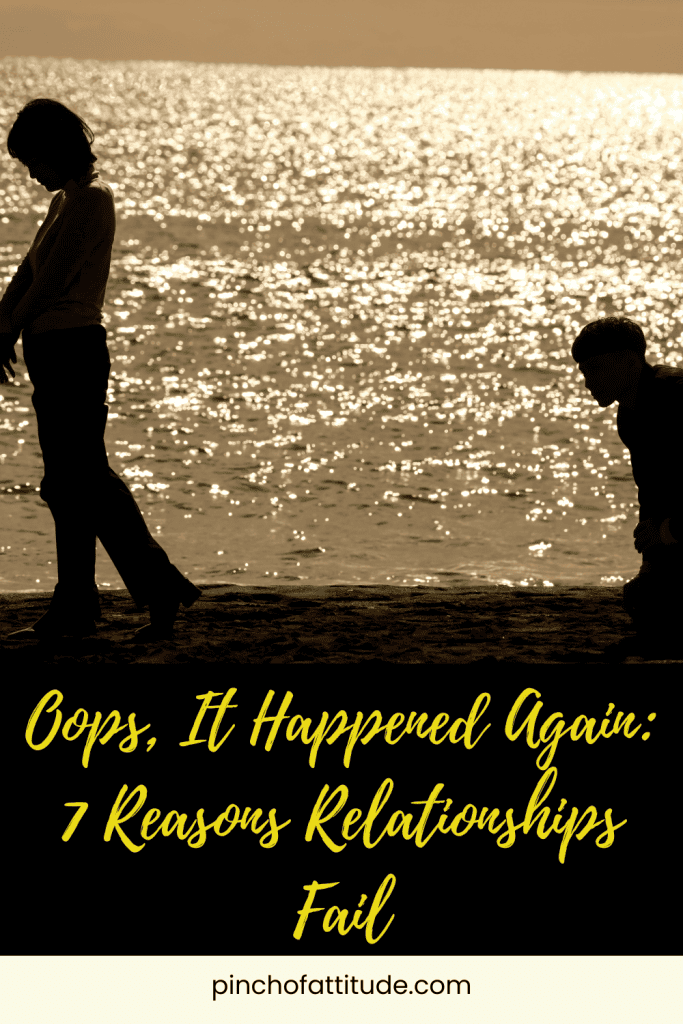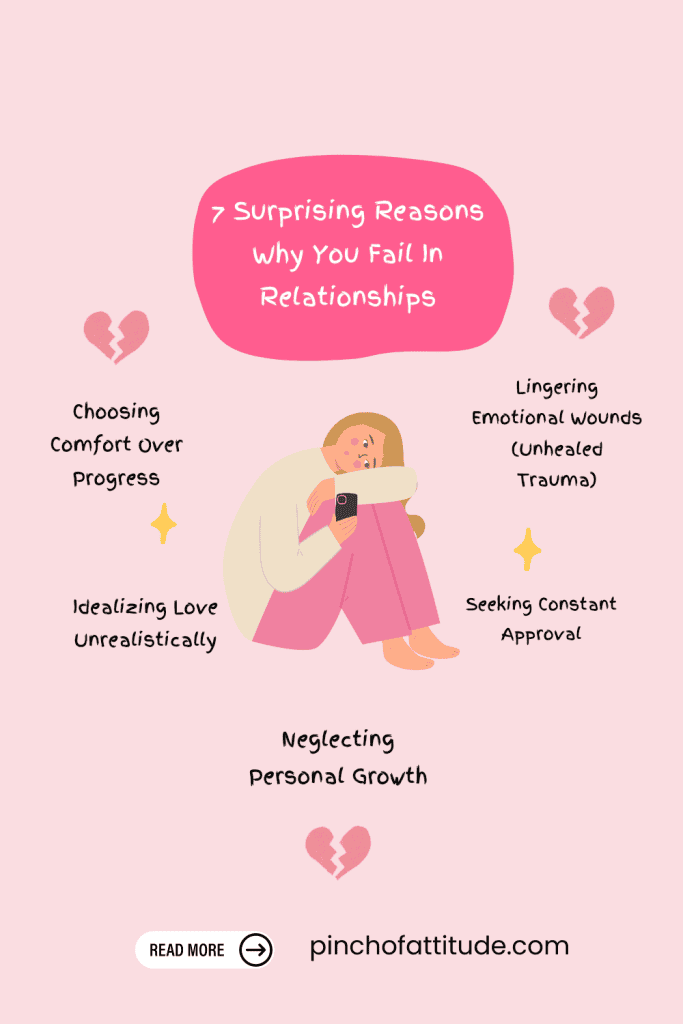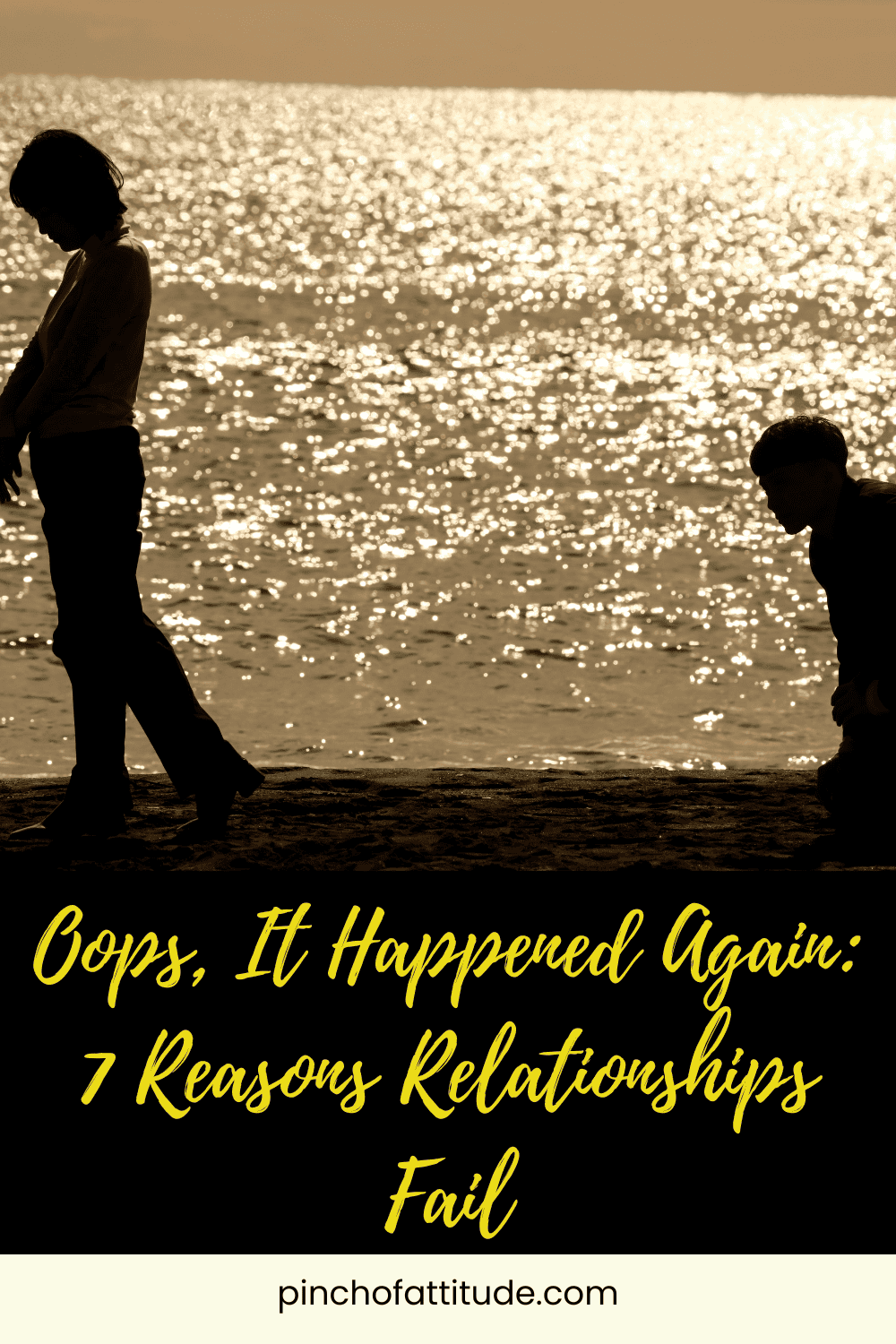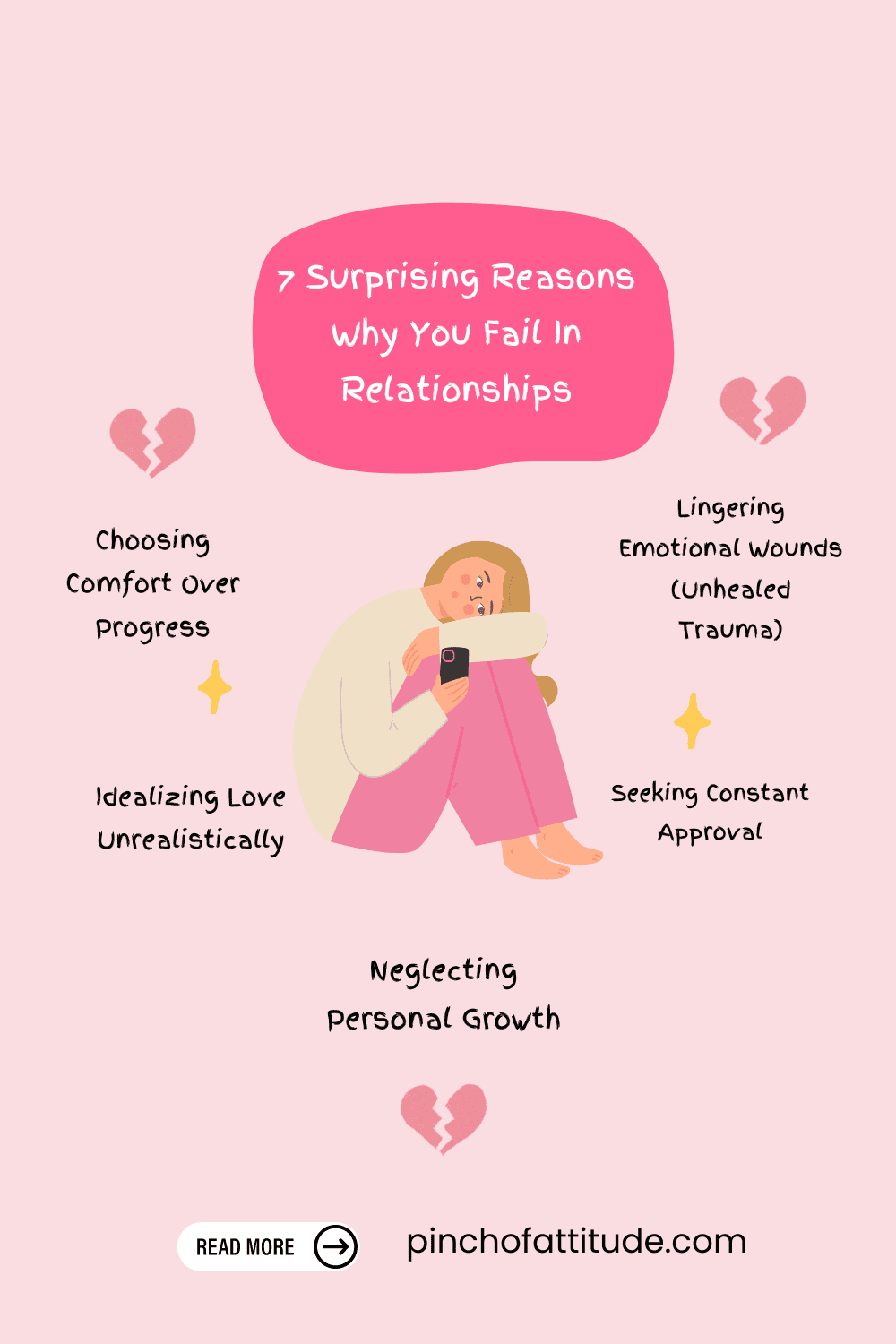Relationships can be a total rollercoaster, you know.
I mean, one moment, you’re on cloud nine, and the next, you’re wondering why things suddenly feel like they’re spiraling out of control.
While it’s easy to point fingers, sometimes the key to understanding why relationships fail lies in examining our own habits, behaviors, and yes, even our baggage.
This isn’t about blame, it’s about awareness. Because if you know what’s holding you back, you can start fixing it.
So, buckle up! We’re about to get into seven surprising reasons why most women struggle in relationships.
And trust me, you and I are not alone in this. These issues are more common than you think, and the best part? They’re all fixable. Let’s get into it.
- Unresolved trauma and emotional baggage can unknowingly sabotage relationships if left unaddressed.
- Prioritizing personal growth and setting boundaries are essential for maintaining healthy, balanced relationships.
- Recognizing when a relationship isn’t right and having the courage to walk away can open the door to better opportunities for love.
Table of Contents
1. Lingering Emotional Wounds (Unhealed Trauma)

Trauma is a tricky beast. You might think that the heartbreak, rejection, or even the childhood wounds you experienced years ago are behind you. But here’s the hard truth: if you haven’t dealt with them, they’re still very much alive in your present.
Lingering emotional wounds can show up in sneaky ways, like anxiety, jealousy, or an inability to trust your partner—even when they haven’t done anything to deserve it.
Ever found yourself overreacting to something minor? That’s likely old wounds rearing their ugly heads. It’s like you’re reacting not just to your partner but to every person who ever hurt you before them.
Your partner asks why you didn’t text back immediately, and suddenly, you’re having flashbacks to when your ex used to control your every move. The issue isn’t really about the text—it’s about the fear and pain still sitting just under the surface.
So what do you do? The first step is to recognize that you’ve got unresolved trauma. Therapy is a powerful tool here. It gives you a safe space to process those past hurts so they no longer control your future.
And let’s be real, dealing with trauma isn’t just about improving your romantic relationships—it’s about improving your relationship with yourself.
2. Seeking Constant Approval

Oh, the dreaded people-pleaser trap. This one’s like quicksand: the harder you try to keep everyone happy, the more you sink into resentment.
Maybe you’re the type who avoids conflict at all costs, always putting your partner’s needs first, thinking, “As long as they’re happy, we’re good.” But here’s the kicker—if you’re constantly giving without ever receiving, your relationship is on a one-way street to burnout city.
People-pleasing feels safe in the short term. You avoid fights, keep the peace, and get that temporary high from being the “good partner.” But long-term? It’s a disaster.
You start to feel invisible like your needs don’t matter. And guess what? That resentment starts to bubble up. It’s not pretty. One day, you’re snapping at your partner for leaving the dishes in the sink when really, you’re pissed that you’ve been sidelining your own happiness for months.
The solution? Boundaries, baby. They’re not just for your mental health; they’re essential for the health of your relationship. Speak up about what you need. It’s okay if it feels uncomfortable at first. In fact, that discomfort is a sign that you’re growing.
Real love means both people matter—your needs are just as important as theirs.
3. Neglecting Personal Growth

It’s so easy to get caught up in the whirlwind of love that you forget about the most important relationship of all—the one with yourself.
In the beginning, it’s all about “us.” You want to spend every waking moment together, and before you know it, your hobbies, passions, and personal goals are gathering dust in the corner.
But here’s the thing: if you lose yourself in a relationship, you’re setting it up for failure. When your world becomes all about the other person, you risk becoming dependent on them for your happiness. And that’s a lot of pressure for any relationship to handle.
Remember who you were before this relationship. What made you tick? What dreams did you have? And more importantly, what are you doing today to nurture those parts of yourself?
Personal growth is a lifelong journey, and while it’s great to grow alongside your partner, you also need to grow independently. Take that class you’ve been meaning to take. Start that side hustle. Rediscover your passions. Not only will it make you happier, but it’ll also make you a more interesting and fulfilled partner.
4. Idealizing Love Unrealistically

Thanks, Hollywood, for giving us a skewed version of love. We grow up watching movies where the guy always shows up with grand gestures, love magically fixes everything, and nobody ever has a morning breath.
Spoiler alert: real relationships are messier than that. But many of us walk into relationships with those fairy-tale expectations, and when reality doesn’t measure up, we feel disappointed.
Here’s a reality check: relationships aren’t perfect. Your partner isn’t going to read your mind or know exactly what you need 100% of the time. And that’s okay.
The key to a successful relationship is learning to love and appreciate your partner for who they are, not who you wish they would be.
Real love is found in the little moments—the ones that don’t make it into the movies. It’s in the way your partner brings you coffee in the morning or how they support you on your worst days.
So drop the script and embrace reality. Perfection is boring anyway. It’s the imperfections, the growth, and the messy, real-life moments that make love worth it.
5. Staying Settled

Deep connections are scary. Let’s not sugarcoat it. It’s one thing to connect with someone on a surface level, but letting them see the real, unfiltered you? That’s a whole other ball game.
Fear of intimacy often stems from a fear of being hurt, rejected, or abandoned. So instead of leaning into the relationship, you might find yourself pulling away, shutting down, or putting up emotional walls.
You want to be close, but the closer you get, the more vulnerable you feel. And that’s terrifying. You start overthinking everything: “What if I let them in, and they leave?” “What if they see my flaws and decide I’m not worth it?”
The irony is that pushing people away doesn’t protect you—it just guarantees loneliness. Opening up takes courage, but it’s the only way to experience true intimacy.
And here’s the thing: being vulnerable doesn’t mean you have to be perfect. In fact, vulnerability is about showing up as you are, flaws and all, and trusting that the right person will love you not despite them, but because of them.
6. Choosing Comfort Over Progress

Comfort zones are, well, comfortable. But they’re also where growth goes to die. If you’re settling into a relationship because it’s safe and predictable, but you’re not pushing yourself or your partner to grow, you’re setting the stage for long-term dissatisfaction.
Conflict, though uncomfortable, is necessary for growth. It’s through those tough conversations that you learn more about each other, find solutions to problems, and build a stronger foundation. Avoiding these conversations because you don’t want to “rock the boat” only leads to resentment and stagnation.
So, challenge each other. Have those uncomfortable talks about where you’re headed, what you both want and how you can improve. Growth is the lifeblood of any healthy relationship, and without it, you’re just marking time.
7. Staying With The Wrong Person

This one stings, but sometimes, no matter how hard you try, the relationship just isn’t right. It doesn’t mean either of you is a bad person—it just means you’re not right for each other.
And the longer you stay in a relationship that doesn’t serve you, the more you rob yourself of the chance to find one that does.
We’ve all been there, holding on to something that isn’t working because we’re scared of being alone or we’ve invested so much time. But ask yourself this: are you staying because you’re genuinely happy, or because you’re scared of what’s on the other side of goodbye?
Walking away from the wrong relationship is hard, but staying in it is even harder.
It’s okay to let go. It’s okay to prioritize your happiness and well-being. And it’s okay to trust that the right relationship is out there waiting for you—one that aligns with who you are and where you want to go.
Related Posts:
- Self-Love in Relationships: Why it Matters?
- Being in a Relationship Without Self-Love: Why We All Do That?
- Overthinking When Dating: Signs, Causes, and Ways To Nip It for Good!
- 23 Simple Hacks on How to Handle Conflict in a Relationship
- How I Start Tough Conversations with My Partner Without Sparking a War
Frequently Asked Questions
Why does unresolved trauma affect relationships?
Unresolved trauma can trigger emotional reactions that negatively impact communication and trust in relationships.
What’s wrong with people-pleasing in relationships?
People-pleasing leads to resentment and prevents healthy boundaries from forming in a relationship.
Why is personal growth important in a relationship?
Personal growth helps you maintain individuality and prevents stagnation in the relationship.
How do unrealistic expectations harm relationships?
Unrealistic expectations create disappointment when reality doesn’t match the fantasy, causing strain on the relationship.
Why is staying with the wrong person harmful?
Staying with the wrong person prevents you from finding a relationship that truly aligns with your needs and goals.




